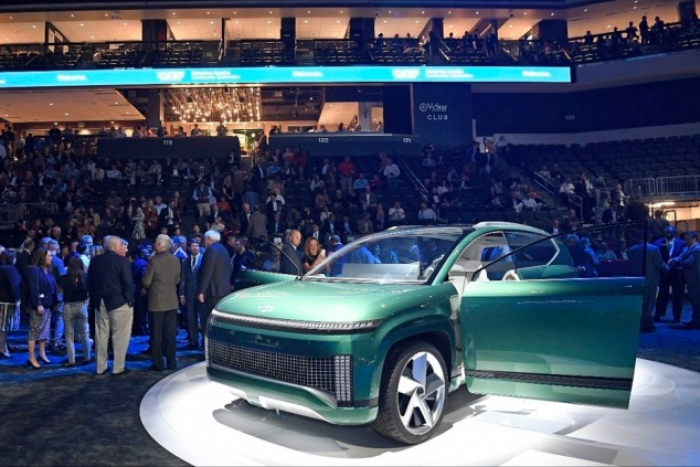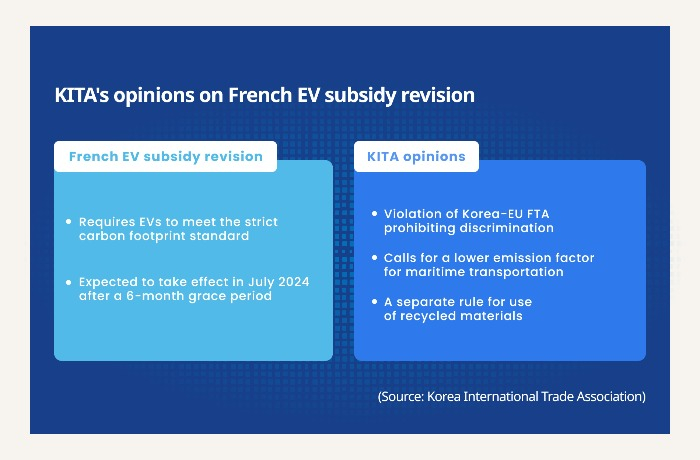France’s new EV subsidy bill may violate Korea-EU FTA: KITA
S.Korean EVs will likely miss out on EV subsidies in France under the revision; other EU nations may follow suit
By Aug 30, 2023 (Gmt+09:00)
LG Chem to sell water filter business to Glenwood PE for $692 million


KT&G eyes overseas M&A after rejecting activist fund's offer


Kyobo Life poised to buy Japan’s SBI Group-owned savings bank


StockX in merger talks with Naver’s online reseller Kream


Meritz backs half of ex-manager’s $210 mn hedge fund



The South Korean auto industry has called for an amendment in France’s new subsidy policy for electric vehicle purchases after voicing concerns that the country’s EV subsidy revision is possibly discriminatory, violating the free trade agreement between Asia’s fourth-largest economy and the EU.
According to industry sources on Tuesday, the Korea International Trade Association (KITA) and Korea Business Association Europe on Friday last week expressed concern to the French government in a letter of opinion that the country’s EV subsidy draft bill may well exclude Korea-made EVs from its tax credits, which could violate the Korea-EU FTA prohibiting trade discrimination.
France is seeking to introduce a new EV subsidy bill, limiting subsidies to EVs that meet the country’s high environment protection standards based on the carbon footprint level of the vehicle’s entire production process.
Because it combines carbon emissions produced in the entire EV value chain, from manufacturing to transportation, EVs shipped by vessels from non-European countries, like Korean EVs, are highly likely to miss out on the country’s subsidies.
EVs in France currently receive tax credits based on their price and fuel efficiency level.
“According to the (French EV subsidy) revision, Korean EVs will likely be discriminated in competition with EVs produced in France and other EU nations,” the KITA’s letter of opinion read, calling for a removal of the measure that discriminates against Korean EVs in the final draft.

It noted especially that the carbon emission coefficient, or an emission factor (EF), for maritime transportation in the revision is 10 times higher than the internationally recognized one, which must be amended or abolished.
ANTI-CHINESE EV POLICY TAKES TOLL ON KOREAN EV MAKERS
The new EV subsidy policy in France is said to be intended to ward off the ascent of Chinese EVs in the country by encouraging EV production on its soil or in Europe, like the Inflation Reduction Act (IRA) by the US.
In response to the US IRA that doles out tax credits only to EVs produced in the US and made of parts and materials sourced from the US or its trading partner countries, Korean EV car and battery makers are rushing to ramp up local production in the US.
Korean auto giant Hyundai Motor Co. broke ground on a $5.54 billion EV and battery plant in the US state of Georgia in October last year with an aim to start commercial production for EVs from Hyundai Motor Group auto brands in the first half of 2025.

As China-made EVs are rapidly expanding their presence across Europe, the Korean EV industry is worried that France’s new EV subsidies could trigger other European nations to follow suit, which could be another major stumbling block to Korean EV sales in Europe.
Korea’s top two automakers Hyundai Motor and its sibling Kia Corp. said they together sold 16,570 EVs in France last year, making up the fifth-largest share in the country’s EV market.
The two delivered a combined 143,460 EVs across Europe in 2022, according to the European Automobile Manufacturers Association.
Earlier this month, the Korean industry ministry said it will also continue communicating with the French government regarding the European country’s new EV subsidy policy, which could slow Korea’s automobile exports to Europe, and come up with proactive measures.
The French government received opinions about its EV tax credit revision from countries and businesses until Aug. 25 after the country unveiled the draft bill in late July.
The new bill is expected to take effect in July 2024, after a six-month grace period, at the earliest.
Write to Nan-Sae Bin at binthere@hankyung.com
Sookyung Seo edited this article.
-
 AutomobilesNo subsidy, no problem: Hyundai, Kia make top 10 US list for EV sales
AutomobilesNo subsidy, no problem: Hyundai, Kia make top 10 US list for EV salesJul 24, 2023 (Gmt+09:00)
1 Min read -

-
 The KED ViewTime for South Korea's answer to the US battery subsidy act
The KED ViewTime for South Korea's answer to the US battery subsidy actApr 04, 2023 (Gmt+09:00)
3 Min read -
 Business & PoliticsKorea’s new EV subsidy plan favors Hyundai over Tesla, other imports
Business & PoliticsKorea’s new EV subsidy plan favors Hyundai over Tesla, other importsFeb 03, 2023 (Gmt+09:00)
4 Min read


